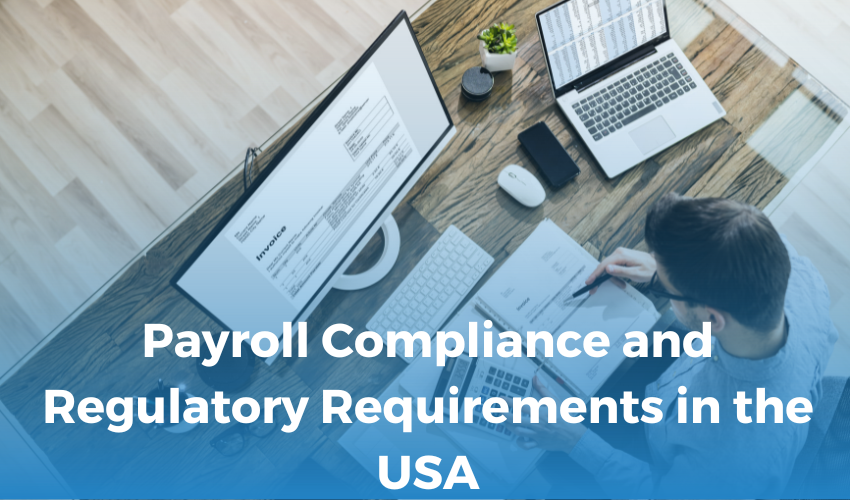

11-10-23
Payroll compliance is a fundamental aspect of every business in the United States. Navigating the intricate web of federal and state regulations is crucial for employers to avoid penalties and maintain good standing with employees. In this comprehensive guide, we'll delve into the essential elements of payroll compliance and the regulatory requirements employers must adhere to in the USA, providing a clear roadmap for businesses to meet their obligations while ensuring employees are compensated fairly and in accordance with the law.
Understanding Payroll Compliance
What is payroll compliance?
Payroll compliance refers to a company's adherence to the laws, regulations, and tax requirements governing the payment of employees. It encompasses various aspects, including wage and hour laws, tax withholding, benefits administration, and record-keeping. Compliance ensures that employees are paid accurately and on time, while employers fulfill their legal responsibilities.
The Significance of Payroll Compliance
Ensuring payroll compliance is vital for several reasons:
1. Legal Obligations: Employers must comply with federal and state laws to avoid penalties and legal repercussions.
2. Employee Trust: Accurate payroll instills trust and confidence among employees, as they rely on timely and correct compensation.
3. Business Reputation: Maintaining payroll compliance enhances a company's reputation and minimizes the risk of litigation.
Key Components of Payroll Compliance
Wage and Hour Laws
The Fair Labor Standards Act (FLSA) sets standards for minimum wage, overtime pay, and child labor. Employers must classify employees correctly as exempt or non-exempt, keeping detailed records of hours worked and paying overtime as required.
Tax Withholding
Employers are responsible for withholding federal income tax, Social Security, and Medicare taxes from employees' paychecks. These withholdings must be accurately calculated and remitted to the appropriate tax authorities.
Benefits Administration
Administering benefits like health insurance, retirement plans, and flexible spending accounts (FSAs) requires compliance with regulations, including the Affordable Care Act (ACA) and the Employee Retirement Income Security Act (ERISA).
Record-Keeping
Accurate record-keeping is crucial for payroll compliance. Employers must maintain records related to wages, taxes, benefits, and hours worked, among other data.
Regulatory Requirements in the USA
Federal Regulations
1. Fair Labor Standards Act (FLSA): This federal law establishes minimum wage, overtime pay, and child labor standards for employees.
2. Internal Revenue Service (IRS) Regulations: The IRS sets guidelines for federal income tax withholding, Social Security, and Medicare taxes.
3. Affordable Care Act (ACA): ACA mandates that large employers provide health insurance to full-time employees and report on coverage offered.
4. Family and Medical Leave Act (FMLA): This law requires certain employers to provide unpaid, job-protected leave for qualified medical and family reasons.
State Regulations
States often have their own specific payroll regulations, including minimum wage rates, overtime rules, and family and medical leave laws. Employers must be aware of both federal and state requirements and adhere to the stricter of the two, where applicable.
Compliance Challenges and Penalties
Non-compliance with payroll regulations can result in significant challenges and penalties for employers. Common challenges include:
• Legal Consequences: Employers may face legal actions, lawsuits, and government audits.
• Financial Penalties: Non-compliance can lead to fines, penalties, and back wage payments to employees.
• Reputation Damage: Compliance violations can tarnish a company's reputation and lead to employee mistrust.
Operational Disruption: Dealing with compliance violations can disrupt business operations.
Ensuring Payroll Compliance
Steps to Ensure Payroll Compliance
1. Stay Informed: Keep up to date with changes in federal and state regulations to ensure compliance.
2. Proper Classification: Correctly classify employees as exempt or non-exempt based on FLSA guidelines.
3. Accurate Record-Keeping: Maintain meticulous records of employee hours, wages, and taxes.
4. Benefits Administration: Administer benefits programs in line with applicable regulations, such as ACA and ERISA.
5. Regular Audits: Conduct regular internal audits to identify and rectify compliance issues.
6. Compliance Software: Consider using payroll and HR software that can help automate compliance tasks.
Conclusion
Payroll compliance is a critical aspect of every business's operations in the United States. Adhering to federal and state regulations is essential for legal and financial reasons, as well as for maintaining employee trust and a positive business reputation. Navigating the complex landscape of payroll compliance requires diligence, accurate record-keeping, and a commitment to staying informed about changing regulations. By following best practices and seeking professional guidance when needed, businesses can ensure compliance while providing employees with fair and accurate compensation, ultimately contributing to their success and reputation in the marketplace.
Tags :













































.jpg)
.jpg)
.jpg)
.jpg)


).jpg)














 Get A Quote
Get A Quote
Leave A Comment